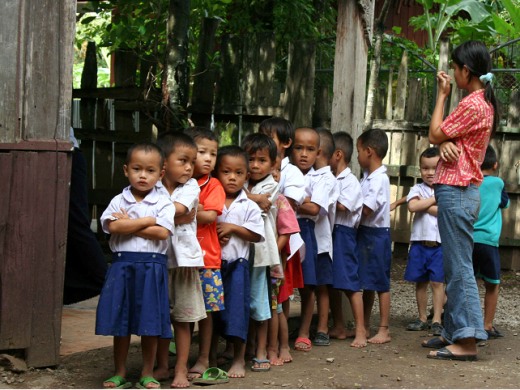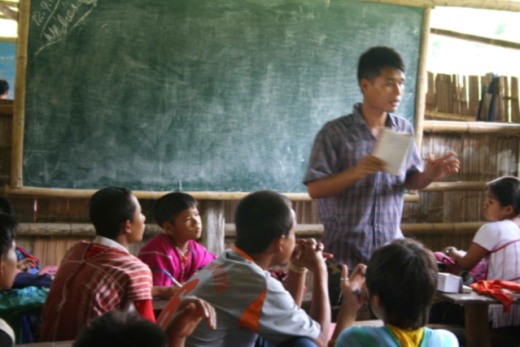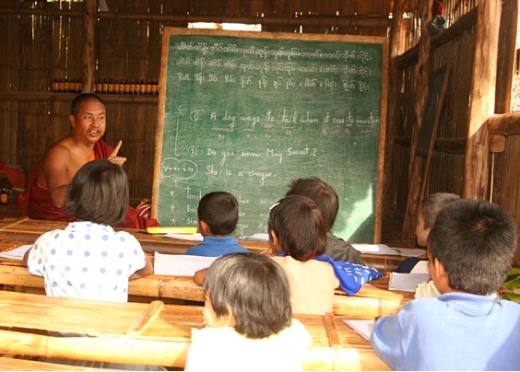Editorial
You can read more on working in Burma in this issue of HLT: Bewitched by 25 Students submitted by Agnese Bartoli, Hugh’s colleague and friend. This is Hugh’s last article. Hugh is remembered by his friends in Remembering Hugh Cory in this issue of HLT
Critical Thinking
Simon Says, for Burma, Hugh Cory
Hugh Cory was a teacher and teacher trainer. Britain and Italy. For the last 2 years of his life he was working with Burmese refugees on the Thai/Burmese border, most recently with the Karen Teacher Working Group / Karen Teacher Training College www.ktwg.org . Hugh submitted the article to HLT a few months before his untimely death.
If my mission in life was to “humanise” teaching, where better to start than an educational system that aims not for the realisation of children’s potential but for unquestioning obedience and conformity?
So although I left my Moskowitz, my Cuisenaire rods and even my Ericksonian Hypnosis Cards TM at home on a shelf when I set off for the Thai Burma border, and if my teacher training work with Burmese and Karen refugees has on occasion promoted PPP rather than NLP as the next step forward in language teaching, I feel I still have some claim on a space in this forum.
I’m going to start by talking about a book. In “From the Land of Green Ghosts” Pascal Khoo Thwe, a member of the Kayan ethnic group in Burma (aka Padaung, or Long-Neck Karen), tells his improbable story. He was studying English Literature at Mandalay University in 1988 when it was closed down during the student unrests that culminated in Aung Sang Su Kyi election and imprisonment. With the university closed down, PKT was working as a waiter in a Mandalay restaurant when he met a professor from Cambridge University. And when forced into hiding and the armed resistance, he stayed in touch with the professor, and before long he found himself studying at Cambridge, where he graduated in 1995.
Coming from such a background, the challenge of studying English Literature at Cambridge was daunting on many fronts.
The hardest thing, though, was the very idea of forming my own opinion. In my first term I was reading Renaissance English literature, including Spenser, Milton and Donne. Not only was I expected to master these texts – difficult for me both in their language and in their historical and religious background – but I had also to come to a personal point of view on them. Nothing could have been more opposed to the whole pattern of my previous education, and the thought of writing essays on my own was as frightening to me as the experience of defusing a landmine.
Clearly education in Burma needs, more than anything else, needs the introduction of critical thinking, as a basic principle. But it’s one thing to grasp such a huge cultural difference intellectually, it’s another to actually live with this awareness. I’m constantly taking it for granted that my students will know how to look at two sides of a question and come to a conclusion – but no, they don’t know this, any more than a class of English teenagers knows how to build a bamboo hut.
My only previous experience of this culture clash was a few years ago, working with a group of mainland Chinese teachers of English on an intensive course at a British university. I discovered that an “essay” might be simply copied word for word from lecture notes or from a book in the library. For the British university this was shocking, scandalous, verging on the criminal. Everyone knows you’re supposed to change the words a bit to make the text look like your own ideas, to use at least two sources so that it looks like you’re thinking for yourself, and to at least pretend to find fault with some of your source’s opinions.
PKT goes on to argue that without critical thinking you don’t have freedom of thought, and without freedom of thought you can’t have democracy:
I learned that some famous literary critics (...) had not greatly admired either Milton or Spenser, arguing that the language they used was not sufficiently precise, or that it lacked “sensuous vividness”. I tried to get my mind around the idea that I could take up a position on such arguments, and form personal opinions about these giants from the past. This was a freedom, I began to feel, even more radical than political freedom. Perhaps it was even a basis for other sorts of freedom. In Burma, while we called for democracy, we had not yet developed any serious idea of freedom of thought.
So PKT’s position isn’t just an attack on the spectacularly awful Burmese school curriculum. He recognises that this approach to education is not the work of the current regime, it is well rooted in Burmese traditions.
The more I became acquainted with the vast possibilities of Western education, the more angry I became at the grotesque restrictions imposed on mental development by the Burmese regime. Yet at the same time, Cambridge taught me that you could not blame all that simply on a regime – for our conformity and our willingness to learn parrot-fashion was deep in our culture.

conformity and great human potential – an autonomous school for Burmese migrant workers in Thailand
Since finding PKT’s highly readable book, I have used this text as a springboard to discussing Critical Thinking in teacher training workshops here, including with the Karen Teacher Working Group www.ktwg.org, with Kayan refugees at the Karenni Teacher Training Centre, and at the ESC in Nu Po camp www.escnupo.com The only element of PKT’s argument that anyone challenges is whether the study of Literature is a good way to learn Critical Thinking. I’m not going to tell these teachers that it worked for me, the same critical mechanisms that got me as a student writing theatre reviews and satirical attacks on the establishment in student magazines, these same mechanisms are the bedrock of my sales resistance today, my critical approach to the rhetoric and deceptions of both advertising and politics. I’m sure there’s a more direct route, with no need for Spenser or Milton.
As I say, this brief article doesn’t aspire to offer solutions, a roadmap for the introduction of Critical Thinking into the Burmese (and the Karen) curriculum. There’s already Dr Thein Lwin in Chiang Mai doing this, through his writings and at his Teacher Training Centre for Burmese Teachers www.educationburma.net
For the time being, my main overt strategy as a teacher trainer is to promote a QIQ lesson shape for planning and “content” lessons across the curriculum. Whether one is teaching History or Geography or Literature or Science, to start with Questions to draw out what the students already know and get them interested in learning more; to move on to the new Information; and to conclude with Questions that encourage the students to respond to the new information, making connections with their existing knowledge, accommodating it... For the worksheet that goes with the PKT text, two of the questions I ask are:
- What do you (as a teacher and/or teacher trainer) do to promote critical thinking?
- In what ways is conformity and obedience a good thing, and in what ways is it a bad thing?

engaging the students’ interest: Moo Htoo teaching in Mae La refugee camp
The second of these is one I can’t answer. In promoting critical thinking, are we not in danger in paving paradise and putting up a parking lot? One of the reasons that these students are so wonderful to work with is that they are so respectful. Part of the beauty of Karen conformity is that all generations tend to pull together towards the same goal, apparently putting the common good first and frowning on individualism. One reason that many people in South East Asia are so cheerful is that they tend to have “the serenity to accept the things they cannot change” – which includes just about everything when you’re poor and oppressed and living under a military tyranny – so they don’t even need to worry about “the courage to change the things they can, and the wisdom to know the difference.”

a monk teaching English at his monastery in Nu Po refugee camp, Thailand.
What else do I do to promote critical thinking in my classroom? Well, refusing to “teach” the students is a start. I can’t imagine teenage and adult students learning from listening to the teacher. Give them a task. Then of course they’ll keep asking “Teacher, is this right?” and as often as not the answer will be “What do you think?” Doesn’t go down too well at first, but that’s just babies crying when you stop spoon feeding, a brief crying phase till they quickly learn to feed themselves.
Then I suppose there’s the clumsy mistakes on the blackboard. Now we really turn classroom power relations on their head, with students constantly picking me up on my mistakes. I aim for a mistake in most lines, which the students must spot and challenge.
And finally, on teacher training courses, we invented Critical Thinking Simon Says. To help teachers rethink their role in class. We start by learning the usual rules. If “Teacher says” touch your nose, then you must do it. No “Teacher says”, and you don’t do it. Then we move on to the critical thinking version. “Teacher says touch your nose.” Don’t do it! Nobody move! Just ask “Why?”. Only if teacher says “because” should you do it. Oh, the fun we have.
Very silly, but there’s a serious point. There’s a fundamental contradiction between the supposed promotion of critical thinking, which enlightened locals and NGOs pay lip-service to, and an ongoing system of power relations where teachers and managers rarely feel the need to give a good reason when telling people to do things. In Karen State as in Burma, we’re still a long way from democracy.
I doubt it, but perhaps a subversive clown from an alien culture can help break the mould. Just so long as he doesn’t do more harm than good. So far so good I hope. At least we all have lots of fun.

Please check the Expert Teacher course at Pilgrims website.


|